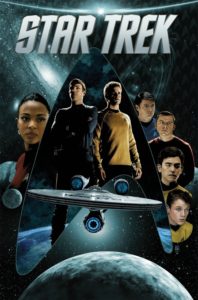 In the third and final installment of my Star Trek movie-themed articles, we’ll explore that bugaboo of 21st century Hollywood as it applies to Star Trek: the reboot.
In the third and final installment of my Star Trek movie-themed articles, we’ll explore that bugaboo of 21st century Hollywood as it applies to Star Trek: the reboot.
J.J. Abram’s Star Trek was as welcome and anticipated as when the original series was revived with Star Trek the Motion Picture. Star Trek is the Michael Myers of science fiction: no matter how many times you think it’s been killed, it refuses to stay dead. Once again it rises like a phoenix in a rebooted form.
It’s common knowledge that Hollywood has lost its soul, its courage, and its creative spirit with the endless remakes, reboots, and adaptations of movies, television shows, and graphic novels. I can barely hold back the stomach bile with every release of Yet Another Superhero Movie.
So how does this second Star Trek reboot compare to the first? Let me just say that I won’t bother continuing the numbering scheme from my first two Star Trek articles. Nemesis violated that, and it turns out, the new reboot has a new and universal curse: the curse of both even and odd numbered J.J. films.
Star Trek
The only movie that carries the same name as the original series, Star Trek is an evil succubus that seduces its victims into making love with it, but sucks them dry in the end. Reincarnating the whole original crew as their younger selves, casting with remarkable skill to echo the personalities of the original characters, promising a prequel view of the early days of the Enterprise, and adding a flood of dazzling new effects with state-of-the-art technology, plus a sweet final appearance from Leonard Nimoy as Spock, how can it go wrong?
It can blow up Vulcan, that’s how.
And with that stroke of outrageousness, 50 years of carefully, lovingly crafted Star Trek lore goes down the shitter. This is a blasphemy worthy of stoning. We need to revive the Spanish Inquisition just to torture J.J.
Now I realize that there were legal rights issues, that addressing the original series too closely would have violated rights Paramount didn’t have. The ownership of various Star Trek rights are spread out all over the place like jam spread too thin over toast. So they had to do something.
But come on! Blow up Vulcan? We love Vulcan! Why, you might as well kill off Spock.
 Oh wait, they did. But they also brought him back in the next movie. My crystal ball says there’s no Star Trek: The Search for Vulcan in our cinematic future.
Oh wait, they did. But they also brought him back in the next movie. My crystal ball says there’s no Star Trek: The Search for Vulcan in our cinematic future.
And with that, the Kelvin timeline was born, a timeline where the real Star Trek ceases to be. Named after the USS Kelvin that Kirk’s father commanded that was blown up in the first sequence of the movie. But also the name of the temperature scale used in the halls of science called the Kelvin scale. Its degrees are the same size as Celsius degrees, but starts at absolute zero. Which perhaps is also a nod to the temperature of the vaporized bits of Vulcan now floating in space.
Surely they could have come up with something less drastic. But even worse than that is the means by which the future Romulans blew up Vulcan, a science fiction idiocy on the level of aliens in lipstick tubes wiping out Earth because there are no more whales to sing to them, or James Cameron’s unobtainium, an embarrassingly clunky and stupid name for a magical element in science fiction if there ever was one. The Star Trek version of these is the laughably named “red matter.”
 What the devil is red matter? The answer is, nothing! Absolutely, positively nothing! A silly, lazy MacGuffin to act as a clumsy plot device to blow up our favorite alien planet and rob us of 50 years of Star Trek. There is utterly no attempt, even a feeble one, to scientifically justify the existence of a thing called red matter, like Star Trek has always tried to do. It just is because the plot needs it to be. They couldn’t even bother to think up a cool scientific-sounding name for it. I imagine they were sitting around discussing, “What shall we call it?” And someone said, “Well, physicists talk about dark matter, and this stuff is red, so…”
What the devil is red matter? The answer is, nothing! Absolutely, positively nothing! A silly, lazy MacGuffin to act as a clumsy plot device to blow up our favorite alien planet and rob us of 50 years of Star Trek. There is utterly no attempt, even a feeble one, to scientifically justify the existence of a thing called red matter, like Star Trek has always tried to do. It just is because the plot needs it to be. They couldn’t even bother to think up a cool scientific-sounding name for it. I imagine they were sitting around discussing, “What shall we call it?” And someone said, “Well, physicists talk about dark matter, and this stuff is red, so…”
But physicists justify the existence of the concept of dark matter, even though it still remains a theoretical, unproven concept. What the hell is red matter? Even for an imaginary world, what is it?
Star Trek turns out to be non-Star Trek in an even more important way than the new timeline. Star Trek TV shows have generally been thoughtful stories exploring meaningful issues. Star Trek has none of that. It’s nothing more than a glitzy adventure roller coaster ride, which is where the succubus seduction comes in. You think you’re loving it while you watch it, but when it’s all over and your adrenaline and dopamine levels return to normal, you begin to realize how empty the experience was. It’s just action fluff. It’s cotton candy. No substance. And unlike other Star Treks, you don’t feel much of an urge to watch it again.
 And those lens flares. God, those lens flares! What’s with all the lens flares? Artificially dubbed-in lens flares, no less. Until Star Trek, I never realized lens flares could be an official, full-fledged fetish, but apparently J.J. has it.
And those lens flares. God, those lens flares! What’s with all the lens flares? Artificially dubbed-in lens flares, no less. Until Star Trek, I never realized lens flares could be an official, full-fledged fetish, but apparently J.J. has it.
The ugly truth is that J.J. didn’t resurrect Star Trek. He created a deceptive counterfeit devoid of the soul of Star Trek. He conned us. Like he did with Lost.
Star Trek is still dead.
Star Trek Into Darkness
Will history repeat itself? Will the second movie of the reboot vastly improve over the first, as Khan improved over Star Trek the Motion Picture?
Not on your life. In fact, it gets worse.
In addition to all the ills of his first Star Trek, J.J. finds more sins to commit in this second installment. In a move that is seriously mindboggling, he does the exact same thing the original second movie did: he rips of the TV episode “Space Seed.”
He brings Khan back again! Is there no originality left within the Star Trek team anymore?
 Oh, but he doubles down this time. He not only rips off “Space Seed” again, he turns around and rips off The Wrath of Khan too, in the most blatant, cynical, contrived plagiarism imaginable. He mirrors the death scene of Spock, but with Kirk being irradiated this time and Spock on the outside. They literally run through the same lines again, only swapped, and I’m sure in J.J.’s mind, this is supposed to be profound somehow, some kind of homage to the original scene. Instead it comes across as cynical, as a mockery of that scene, and holds none of the emotional power of the original scene.
Oh, but he doubles down this time. He not only rips off “Space Seed” again, he turns around and rips off The Wrath of Khan too, in the most blatant, cynical, contrived plagiarism imaginable. He mirrors the death scene of Spock, but with Kirk being irradiated this time and Spock on the outside. They literally run through the same lines again, only swapped, and I’m sure in J.J.’s mind, this is supposed to be profound somehow, some kind of homage to the original scene. Instead it comes across as cynical, as a mockery of that scene, and holds none of the emotional power of the original scene.
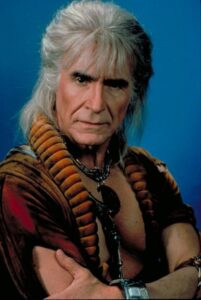 Then he goes and rips off The Search for Spock by shouting, “Just kidding!” and brings Kirk back from the brink of death through some magical property of Khan’s blood. The red matter equivalent for movie #2, I guess. But he does it all in one movie, rushed so it saps any possible emotional impact. Slam bam, thank you, ma’am!
Then he goes and rips off The Search for Spock by shouting, “Just kidding!” and brings Kirk back from the brink of death through some magical property of Khan’s blood. The red matter equivalent for movie #2, I guess. But he does it all in one movie, rushed so it saps any possible emotional impact. Slam bam, thank you, ma’am!
 The same shallow cotton candy as the first film, the same ennui in ever watching it again. And those lens flares. God, those lens flares! I don’t know how, but he manages to squeeze even more lens flares into this one. Instead of every scene, they’re in every shot. I never realized I could come to loathe lens flares at a level equal to loathing Hitler.
The same shallow cotton candy as the first film, the same ennui in ever watching it again. And those lens flares. God, those lens flares! I don’t know how, but he manages to squeeze even more lens flares into this one. Instead of every scene, they’re in every shot. I never realized I could come to loathe lens flares at a level equal to loathing Hitler.
Star Trek is still not only dead, but now J.J.’s defiling the body.
Star Trek Beyond
One thing I haven’t mentioned is the theme songs for all three films don’t sound much like Star Trek themes, whereas pretty much all of them in the original and Next Generation movies do evoke the spirit of Star Trek. The theme for Star Trek Beyond comes closest, I suppose, but only marginally.
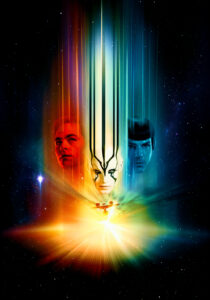 At this point, is there any hope left for Star Trek? Can something be salvaged in the third installment? Going into the theater, I was skeptical. But as I said in the beginning, three articles ago, Star Trek is simply one of those franchises where you have to see them all—because it’s Star Trek, at least nominally.
At this point, is there any hope left for Star Trek? Can something be salvaged in the third installment? Going into the theater, I was skeptical. But as I said in the beginning, three articles ago, Star Trek is simply one of those franchises where you have to see them all—because it’s Star Trek, at least nominally.
My skepticism sadly was not disappointed. Even though its critical reviews were generally positive, there was no justification for that. It was just more of the same. Entertaining enough to watch once, but sacrificing substance in the name of action. Catering to the same crowd that loves superhero after dreary superhero movie.
 Two more installments were planned, including a possible Quentin Tarantino directed version—which would have been something to behold. God knows how that would have turned out, but we know it would have been different and provocative. But in spite of the favorable reviews, the movie underperformed, and that made the powers that be want to limit the budget for the following films.
Two more installments were planned, including a possible Quentin Tarantino directed version—which would have been something to behold. God knows how that would have turned out, but we know it would have been different and provocative. But in spite of the favorable reviews, the movie underperformed, and that made the powers that be want to limit the budget for the following films.
Meaning they wanted to pay Chris Pine and Chris Hemsworth less. But that made them bail on the franchise, and it looks like that torpedoed any future movies. One might be outraged at such crass greed, but perhaps it’s a blessing in disguise. The Kelvin reboot was going nowhere, and it was time to let this latest revival of the iconic franchise die a peaceful death.
R.I.P. Star Trek—again.
Star Trek Discovery
But not quite.
It’s not a movie franchise. It’s a new TV series after decades of nothing but reruns on the small screen. But it’s also a reboot, so I include it here. In fact, it’s a reboot from hell.
 Literally from hell, and CBS is Satan. The elderly among us may remember that CBS was one of the networks Gene Roddenberry pitched his “Wagon Train to the Stars” to, but they turned it down in favor of the embarrassingly imbecilic Lost In Space. NBC turned out to be the insightful network, and they ordered a pilot. But they declared the pilot “too cerebral,” and to be honest, it was. It plodded along at a dreary pace with very little action to it.
Literally from hell, and CBS is Satan. The elderly among us may remember that CBS was one of the networks Gene Roddenberry pitched his “Wagon Train to the Stars” to, but they turned it down in favor of the embarrassingly imbecilic Lost In Space. NBC turned out to be the insightful network, and they ordered a pilot. But they declared the pilot “too cerebral,” and to be honest, it was. It plodded along at a dreary pace with very little action to it.
Then NBC did something unheard of in television history to that date. They ordered a second pilot. A second chance. God knows how they got talked into that, but aren’t we all glad they did? That second pilot sold, and a monster franchise was born.
So you see, it’s an abomination that CBS should end up owning the rights to Star Trek television after all. They squandered their right to it like Esau squandered his birthright for a mess of pottage. NBC took the risk, did the heavy lifting, to launch the franchise, while CBS insulted our intelligence yet again with Lost In Space, as networks back then were prone to do. So CBS owning Star Trek now is an abomination, and makes one wonder whether a God can exist that would allow such things.
 And just to prove how evil CBS is, what did they do with it? They created Star Trek Discovery.
And just to prove how evil CBS is, what did they do with it? They created Star Trek Discovery.
In other words, they rejected Star Trek again.
 Because other than the title and a few labels like Federation and Klingon, Discovery bears absolutely no resemblance to any incarnation of Star Trek. I somewhat facetiously declared the Kelvin Star Trek as not real Star Trek, but it’s still heavily informed by real Star Trek. Discovery has nothing.
Because other than the title and a few labels like Federation and Klingon, Discovery bears absolutely no resemblance to any incarnation of Star Trek. I somewhat facetiously declared the Kelvin Star Trek as not real Star Trek, but it’s still heavily informed by real Star Trek. Discovery has nothing.
 Discovery is essentially CBS’s Lost In Space for the 21st century. Star Trek is still dead.
Discovery is essentially CBS’s Lost In Space for the 21st century. Star Trek is still dead.
But wait! There’s another series in the works, the one where Patrick Stewart reprises his role as Jean-Luc Picard. Apparently it’s a go and will happen. Is there still hope that Star Trek will live on? Since Stewart’s involved, perhaps we dare to hope again?
 But there are caveats. It’s still owned by CBS, so who knows what they’ll do with it. They’re supposed to ground it with previous Star Trek films, but that includes Kelvin timeline films, so who knows what that could portend? And Stewart may not be as mitigating a factor as we hope. He agreed to do it only if he could do something different with Picard. That sounds ominous.
But there are caveats. It’s still owned by CBS, so who knows what they’ll do with it. They’re supposed to ground it with previous Star Trek films, but that includes Kelvin timeline films, so who knows what that could portend? And Stewart may not be as mitigating a factor as we hope. He agreed to do it only if he could do something different with Picard. That sounds ominous.
 Now if the “different” grows organically out of the original Picard from the life he led in the interim, that could work out fine. But if CBS slaps together a bunch of crap just to make him different, well, CBS has a dismal track record of how it handles Star Trek. I’d love to be pleasantly surprised, but I’m not holding my breath. And it will still only be accessible through CBS’s streaming service, which I have no desire to subscribe to.
Now if the “different” grows organically out of the original Picard from the life he led in the interim, that could work out fine. But if CBS slaps together a bunch of crap just to make him different, well, CBS has a dismal track record of how it handles Star Trek. I’d love to be pleasantly surprised, but I’m not holding my breath. And it will still only be accessible through CBS’s streaming service, which I have no desire to subscribe to.
UPDATE: Since I wrote this, the first season of Star Trek: Picard has come out and the second and third are in production. Did it pleasantly surprise us with its quality?
Not a chance. I didn’t even bother watching it. I heard too much dismal feedback from those who did. Rather than me describing what’s wrong with it who hasn’t even watched it, I’ll let my favorite movie critic, the Critical Drinker, do the dirty work for me…
So Star Trek may be dead after all, with no resurrection of the true spirit of Star Trek in our future. Not if CBS keeps its iron grip on Star Trek. Or Paramount+. Or whatever other corporate shell game of the week they play.
But there’s always reincarnation…
The Orville
Seth MacFarlane may be the most unlikely person to turn to for hope, the man who gave us Family Guy and “I Saw Your Boobs” at the Academy Awards. But he’s always been an enthusiastic fan of Star Trek (and Star Wars), and he incorporates a lot of Star Trek gags into his animated shows, even so far as to feature the entire cast of Next Generation in a full episode of Family Guy that sends up Star Trek fandom. He also cast Patrick Stewart to voice a regular supporting character in American Dad. And he recruited William Shatner to cohost with him on the Oscars in the opening sequence that scandalized Hollywood, but was the most brilliant and entertaining and out-and-out hilarious opening in Academy Award history.
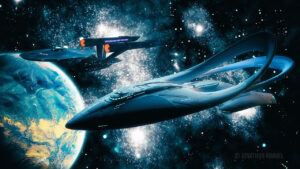 He says it was always his lifelong dream to produce something in the spirit of Star Trek, and at last his dream came true with the creation of The Orville, a hybrid TV show on FOX [now Hulu] that’s both comedy and one-hour science fiction drama. It’s a satire of Star Trek and an homage to Star Trek, particularly The Next Generation. You’ll find MacFarlane’s characteristic earthy humor in it, substantially but not entirely toned down from the outrages of Family Guy, but you’ll find a hefty dose of serious drama too and even relevant issues explored, just like in the heyday of Gene Roddenberry.
He says it was always his lifelong dream to produce something in the spirit of Star Trek, and at last his dream came true with the creation of The Orville, a hybrid TV show on FOX [now Hulu] that’s both comedy and one-hour science fiction drama. It’s a satire of Star Trek and an homage to Star Trek, particularly The Next Generation. You’ll find MacFarlane’s characteristic earthy humor in it, substantially but not entirely toned down from the outrages of Family Guy, but you’ll find a hefty dose of serious drama too and even relevant issues explored, just like in the heyday of Gene Roddenberry.
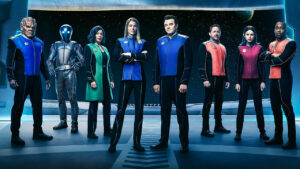 The first shakedown season had its ups and downs, but delivered nevertheless. In the second season currently running as I write this, it found its legs and has transcended its beginnings into something worthy of the Star Trek legacy, while still retaining MacFarlane’s fingerprints all over it.
The first shakedown season had its ups and downs, but delivered nevertheless. In the second season currently running as I write this, it found its legs and has transcended its beginnings into something worthy of the Star Trek legacy, while still retaining MacFarlane’s fingerprints all over it.
In other words, even though it nominally isn’t Star Trek, and has new ship designs, a new universe with new political entities, and new aliens, it’s infused with the spirit of Star Trek through and through. It’s no stretch to call it Star Trek reincarnated.
 Regardless of what happens with Kelvin timelines and CBS pseudo-Star Trek abominations, Star Trek will live on. It has a new name and a new body, but it’s still the spirit of Star Trek, reincarnated as The Orville.
Regardless of what happens with Kelvin timelines and CBS pseudo-Star Trek abominations, Star Trek will live on. It has a new name and a new body, but it’s still the spirit of Star Trek, reincarnated as The Orville.
God works in mysterious ways.
An impressive share, I just given this onto a colleague who was doing slightly evaluation on this. And he actually purchased me breakfast as a result of I found it for him.. smile. So let me reword that: Thnx for the treat! However yeah Thnkx for spending the time to discuss this, I really feel strongly about it and love studying extra on this topic. If attainable, as you grow to be experience, would you thoughts updating your blog with extra particulars? It is highly helpful for me. Large thumb up for this weblog submit!